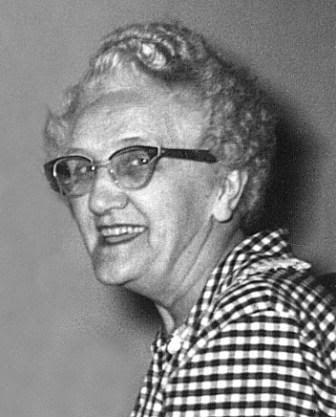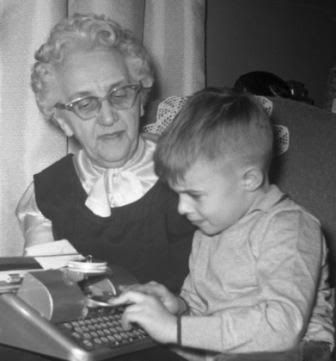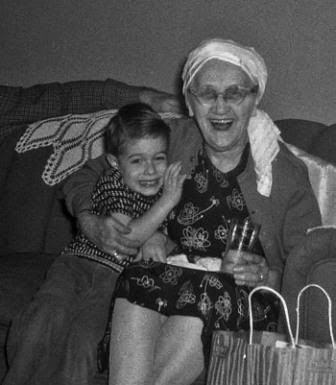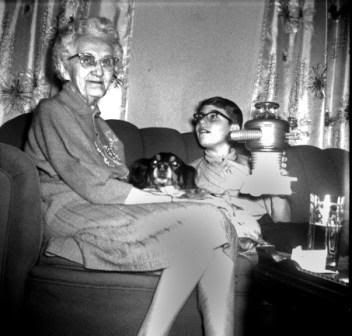By Mike Darwin

“There are so many little dyings that it doesn’t matter which of them is death.” – Kenneth Patchen
I remember. A warm summer day, the smell of her house spilling over through the screen of the aluminum storm door: the smell of barley soup and mothballs and dried rose petals all rolled into one. And I remember her.
 “Grandma, can I come in and play checkers with you?” Her smile, warm and familiar as a sunny autumn day, always beckoned me in. The hours I spent with her! Roaming her basement on cold winter evenings, eating endless bowls of steaming soup and chocolate cake in her kitchen, my cheeks frosted pink from the snowy breeze outside. I loved her. And she loved me. I think the loves of childhood are the best: simple loves, uncritical, filled with hope and pride at a new life entering the world and struggling to make sense of its wonder, and to triumph over it. I know she loved me in that way.
“Grandma, can I come in and play checkers with you?” Her smile, warm and familiar as a sunny autumn day, always beckoned me in. The hours I spent with her! Roaming her basement on cold winter evenings, eating endless bowls of steaming soup and chocolate cake in her kitchen, my cheeks frosted pink from the snowy breeze outside. I loved her. And she loved me. I think the loves of childhood are the best: simple loves, uncritical, filled with hope and pride at a new life entering the world and struggling to make sense of its wonder, and to triumph over it. I know she loved me in that way.
 I don’t know when I first realized she wasn’t my grandmother. She had lived next door to us, shared a huge, sprawling yard with us, took vacations with us, canned applesauce with us, and practically lived with us since before I was born. She had been a second mother to my Mother. Now, she was my Grandmother, and her husband “Papaw” was my “other” grandfather. When I was three or four, Papaw died, and she became even more a part of our lives.
I don’t know when I first realized she wasn’t my grandmother. She had lived next door to us, shared a huge, sprawling yard with us, took vacations with us, canned applesauce with us, and practically lived with us since before I was born. She had been a second mother to my Mother. Now, she was my Grandmother, and her husband “Papaw” was my “other” grandfather. When I was three or four, Papaw died, and she became even more a part of our lives.
Oh, oh, those endless, lovely, gilt-edged days of childhood. Silly things come back. A winter’s morning, with the smell of bacon still in the air, Grandma, and Mom and I, sitting round the old gray Formica topped kitchen table, sticking plastic dots on plain drinking glasses to “decorate” them. One of the innocent pastimes of the 1950′s, which have been swept away in a world of Martha Stewart and Gucci. I remember her arms, her smile, her patience; the hours she spent with me, talking to me, making me feel like the center of the universe.
 “Don’t ever call me granny,” she would say, “it makes me feel like an old lady. And even though I am, I can do without being reminded.” Oh, how I loved her. But time is swift and heartless, and love, if we are to keep it, often asks a high price.
“Don’t ever call me granny,” she would say, “it makes me feel like an old lady. And even though I am, I can do without being reminded.” Oh, how I loved her. But time is swift and heartless, and love, if we are to keep it, often asks a high price.
She grew old, my grandmother. There were “incidents.” She fell down and spent hours on the floor unconscious. She began to repeat herself in conversation. Time. Time was showing its ugly hand. Her son was contacted, and after much discussion and haggling, it was decided she would go to live with him. Her house would be sold, a room would be added to her son’s home, she would move.
 She had another family, of course. A son who lived some miles way (scarcely a block away by California standards). A cool and distant man, whom I never liked. His wife, Elva, was more than cool and distant: she was a hostile, hurtful woman, who I never understood. Perhaps she had her reasons. The ways of adults are often lost on children. Life is hard and can bend and twist people in ways that children can’t begin to understand. All I knew was that she was not a loving person, and that she hurt my “Grandma,” who even if she really wasn’t my grandma really was. I remember once, when Elva and her husband were visiting, Elva went through my grandmother’s house, and informed her of this or that she wanted, when Grandma died. She came to the china set, my grandmother’s pride and joy, and told her that she thought she’d take that now, since she’d get it when Grandma died, anyway. I hated her for that. I hated her for the pain those words caused my Grandma.
She had another family, of course. A son who lived some miles way (scarcely a block away by California standards). A cool and distant man, whom I never liked. His wife, Elva, was more than cool and distant: she was a hostile, hurtful woman, who I never understood. Perhaps she had her reasons. The ways of adults are often lost on children. Life is hard and can bend and twist people in ways that children can’t begin to understand. All I knew was that she was not a loving person, and that she hurt my “Grandma,” who even if she really wasn’t my grandma really was. I remember once, when Elva and her husband were visiting, Elva went through my grandmother’s house, and informed her of this or that she wanted, when Grandma died. She came to the china set, my grandmother’s pride and joy, and told her that she thought she’d take that now, since she’d get it when Grandma died, anyway. I hated her for that. I hated her for the pain those words caused my Grandma.
 I was in my late teens then. A cryonicist. Old enough to know what was going to happen. I went to see her in her new “home.” She spent most of her time exiled in that room, cut off from a family who wanted nothing to do with her, who considered her forgetting what she had just said, and then repeating it, not merely an annoyance, but a grounds for exile. So, she sat, watching soap operas, trying to pass the time.
I was in my late teens then. A cryonicist. Old enough to know what was going to happen. I went to see her in her new “home.” She spent most of her time exiled in that room, cut off from a family who wanted nothing to do with her, who considered her forgetting what she had just said, and then repeating it, not merely an annoyance, but a grounds for exile. So, she sat, watching soap operas, trying to pass the time.
“I’m so unhappy Mikey,” she told me once, with tear filled eyes. Seeing her china sitting in Elva’s fancy glass china cupboard provided only the first of many clues as to why that should be. They hated her. And I do not use that word lightly, or easily. It came across in everything they said and did to her. Chastising her for her forgetfulness, complaining about the crowding of her room, “with things she didn’t need anymore and should just throw out.”
A year or two after Grandma settled in, Elva died. Suddenly, of a heart attack, without a struggle, she was dead. All that evil just coming to a stop, all at once like that, almost made me believe in God. The china cupboard was now Grandma’s, she was now the lady of Elva’s house. But she was still not loved. They used her to cook their meals and darn their socks. Used her, needed her, but I am convinced they did not love her.
 Time is relentless. One day she could not get up to make their meals. She was put in a nursing home. I was 23 by then, living in Indianapolis, with a cryonics facility of “my” own. I worked in the hemodialysis unit of the city’s largest hospital. I had not been to see my grandmother in a long while. Her son, and “distance,” had separated us more than I should have allowed. When word reached me that she was a in a nursing home, I went at once. Dear god, such a place. People, confused and food soiled, wandering the halls. The odor of urine, feces, and rotting flesh from untreated bedsores was overpowering. There were puddles of human excrement in the halls. I could not find an attendant to tell me where her room was. But I found her. She was lying, half out of bed, half on the floor, her arms tied to a side rail of the bed with Posey restraints. She was covered, from waist down, with feces. I found an attendant. I demanded towels, water, soap, clean bed linen and a basin. I was still in scrub clothes from the hospital. They were terrified; they thought I was a doctor. They brought me what I asked for immediately. I cleaned her up. All the while she kept crying and saying “Oh Mikey, imagine you hav’in to do this, and you’re not even my own flesh and blood.” I sushed her, put her in her clean bed, sat with her for awhile.
Time is relentless. One day she could not get up to make their meals. She was put in a nursing home. I was 23 by then, living in Indianapolis, with a cryonics facility of “my” own. I worked in the hemodialysis unit of the city’s largest hospital. I had not been to see my grandmother in a long while. Her son, and “distance,” had separated us more than I should have allowed. When word reached me that she was a in a nursing home, I went at once. Dear god, such a place. People, confused and food soiled, wandering the halls. The odor of urine, feces, and rotting flesh from untreated bedsores was overpowering. There were puddles of human excrement in the halls. I could not find an attendant to tell me where her room was. But I found her. She was lying, half out of bed, half on the floor, her arms tied to a side rail of the bed with Posey restraints. She was covered, from waist down, with feces. I found an attendant. I demanded towels, water, soap, clean bed linen and a basin. I was still in scrub clothes from the hospital. They were terrified; they thought I was a doctor. They brought me what I asked for immediately. I cleaned her up. All the while she kept crying and saying “Oh Mikey, imagine you hav’in to do this, and you’re not even my own flesh and blood.” I sushed her, put her in her clean bed, sat with her for awhile.
 I found the nurses’ desk in that stinking hole of a place and asked to talk to the registered nurse on duty. There was no registered nurse on duty, there was only a licensed practical nurse to be found. A violation of state law; as if, in that chamber of horrors, it mattered. I asked to see her chart. It contained several notes from her physician complaining about the total lack of care there, and stating that, “he had urged her son to move her elsewhere.”
I found the nurses’ desk in that stinking hole of a place and asked to talk to the registered nurse on duty. There was no registered nurse on duty, there was only a licensed practical nurse to be found. A violation of state law; as if, in that chamber of horrors, it mattered. I asked to see her chart. It contained several notes from her physician complaining about the total lack of care there, and stating that, “he had urged her son to move her elsewhere.”
I returned home in a rage. I called her son. I was afraid that if I drove out to see him, I’d kill him. I told him how I had found his mother. I told him to move her to a decent place. He told me to mind my own business. I complained to the State Board of Health about the facilities.
And then I failed her. I did not go back. I could not go back. I did not take her out of there. Had I waited. Had I walked in one evening I could have taken her out of there. Just walked out with her withered body in my arms. No one would have seen, no one would have known. Chances are, no one would have know who to look for, or even where to look. I knew that before I ever made that call to her son. Had I taken her out of there then and there, before I chose the other way of useless calls and worthless indignation, I could have saved her. I was something out of her past. Someone who shared a love with her that the spiteful and uncaring souls who surrounded her would never have been able to guess at.
 Looking back, I know I could have done it. It would not have been easy. It would have required immense courage on my part, and the cooperation and courage of those around me. But I am convinced it could have been done. That is why I never went back. It is why I drove past that place, the few remaining days she had left and never stopped in. Because I knew, I knew what I had to do. I knew the risk I had to take, and I didn’t. She would be cryopreserved now, safely with me still, waiting for time, her enemy, to unstill her hands, and set them loose on making applesauce – and sunshine on winter days.
Looking back, I know I could have done it. It would not have been easy. It would have required immense courage on my part, and the cooperation and courage of those around me. But I am convinced it could have been done. That is why I never went back. It is why I drove past that place, the few remaining days she had left and never stopped in. Because I knew, I knew what I had to do. I knew the risk I had to take, and I didn’t. She would be cryopreserved now, safely with me still, waiting for time, her enemy, to unstill her hands, and set them loose on making applesauce – and sunshine on winter days.
When word of her death reached me it was like a knife through my heart. I did not go to the funeral. I could not go. A part of me was being buried, and I couldn’t stand to watch it.
It can be said that what I failed to do was to kidnap someone. That the only thing I did was act with sense, and decorum, and within the law. That my own survival was at stake. That I could have gone to prison. That I would have been jeopardizing everything. That my hands were tied. I thought all those things at the time. I used them as defenses to stop myself from doing what I really knew I had to do. Those excuses are as useless now as they were useless then. They were and are excuses, but they are not answers, and they do not take away the pain.
Love is precious, it is hard-won, but harder still to keep. It demands much, if we are to be true to it. It is above legal “justice,” beyond time. But it demands courage, and risk, and action.
No matter how long I live. No matter how many centuries unwind before me, I will carry that failure with me, always. If cryonics works for me, if I waken on distant shores, laughing at time, stepping from century to century like they were slippery, moss choked stones in a creek, I will only be partly there. Deep inside, part of me is missing. And I let it slip away. Always, no matter the loves, the times, the distance; part of me will ache and be broken, and there are no salves or medicines, nor any analyst’s couches that can ever fix it. Because of me. Because I let it happen.
It is a bitter lesson. Deep inside of me, I cannot accept my failure. Deep down, I have not given up yet. I cannot, if I am to go on, if I am to live, I cannot give up on her. Not completely. Inside there is still a little hope. Hope overshadowed with grief.
 Oh, Grandma, was it only yesterday you were there to take care of me, to worry over me, to clean my bottom when it was soiled, and to hold me safely in your arms. Oh, Grandma, how could I have been such a coward, how could I have ever let you slip through my loving arms? Could you ever have understood? Could you ever have forgiven me?
Oh, Grandma, was it only yesterday you were there to take care of me, to worry over me, to clean my bottom when it was soiled, and to hold me safely in your arms. Oh, Grandma, how could I have been such a coward, how could I have ever let you slip through my loving arms? Could you ever have understood? Could you ever have forgiven me?
Grandma – I love you, and will always love you, and I swear, no matter what, I will never stand unready again to take the risks that love demands.
Forgive me.

Very touching and inspiring. At least to us cryonicists.
But there you go again–preaching to the choir.
Preach to the masses, Mike. You cannot touch them through the screen of the cryonics-death-immortality taboo. If you want to touch and inspire the masses, you are going to have to find another route.
“If you want to touch and inspire the masses, you are going to have to find another route.”
I don’t agree.
Oh, Ok. You do not agree. That explains everything.
I don’t agree either, and frankly I think most of the masses would find your comment here tasteless.
Unperson wants to turn cryonics outreach into something analogous to game/pick-up artistry. I guess he views himself as a cryonicist version of Roissy.
how is my comment above ‘tasteless’?
Unperson, don’t take this the wrong way, but I’m not sure you’re clued in to how the masses think and feel, so I’m not sure you would see why others would view it as tasteless.
Mark Plus says:
March 7, 2011 at 7:10 pm
Unperson wants to turn cryonics outreach into something analogous to game/pick-up artistry. I guess he views himself as a cryonicist version of Roissy.
————–
nonsense, mark.
No, I don’t think the Roissy model (in any form) is valid for cryonics. Roissy is something best left alone in the context of this discussion.
unperson wrote:
“Very touching and inspiring. At least to us cryonicists.
But there you go again–preaching to the choir.
Preach to the masses, Mike. You cannot touch them through the screen of the cryonics-death-immortality taboo. If you want to touch and inspire the masses, you are going to have to find another route.”
I believe a better phrasing of unperson’s comment is: “There are many people that you won’t be able to [bring into the fold of cryonics advocacy] by invoking the promise of avoidance of death/loss, and especially not with blunt invocation of the promise of “immortality,” which is taboo among many people . This heart-warming “Pearl” essay did a good job avoiding the latter. However, we could inspire and bring more people into the fold of cryonics if [compassion/ avoidance of suffering in poor health] were equally emphasized as the possibility of avoiding death/loss. Also, it would help to mention some spiritual/ religious issues, and demonstrate how they are not incompatible with cryonics.” (see my last two paragraphs for that).
“The ‘screen’ of the cryonics-death-immortality taboo” was a poor choice of words, but don’t get lost on the validity of unperson’s point. If you’re true believers in cryonics, you should advocate it and try to create mass enthusiasm for cryonics. unperson isn’t suggesting conspiring or huckster “selling of” cryonics. Just consider it: creating mass appeal.
For example, there is more appeal to me in the avoidance of suffering than in the prolonging of life. The essay was very touching; I cried. I think it would “touch” just about anyone, but not necessarily inspire or “convert” to cryonics advocacy. I’m NOT interested in vitrification/cryopreservation for myself. You should attempt to create mass appeal, convert the masses, and convert people like me. You need to figure out how to create the appeal. The more quickly cryonics R&D reaches “critical mass,” the more quickly reanimation will become feasible.
Assisted suicide, euthanasia, and cryonics –to a utilitarian such as myself– are all “blessings” to humanity because they can prevent the deplorable quality of life and wasting away of mind and body that presently comes with old age.
Personally, I much prefer euthanasia and assisted suicide to cryonics. I have no faith in future SOCIETY to revive me in a better, future world. “The future” sometimes scares me more than it inspires and excites me. As a child I dreamed of living for thousands of years and exploring space.
But economic, technological, and social reality scare me more and more with each passing year.
Suicide + incineration is my present plan for avoiding suffering.
I apologize if this is too vivid for you, but: If I reach old age in poor health –longevity isn’t enough for me, quality of life is everything– I’m definitely going to committ suicide and I’m not going to seek vitrification/ cryopreservation. Maybe I’ll bring a barrel of gasoline out to a remote desert location, hop in, hold a cigarette lighter in one hand and put a bullet in my head with the other hand. If all goes to plan, my body will be incinerated.
I do NOT want to be around if AGI (Artificial General Intelligence) get out of control and decide to start vivisecting and experimenting on humans. Humans dissect everything in order to understand it. Why wouldn’t AGI do the same?
However, I fully intend to live indefinitely and perhaps for thousands of years.
I intend to help develop cures/preventions for diseases, including aging.
But I sleep with a gun under my pillow and I’m ready to end my life in an instant if I anticipate intense or prolonged suffering.
If a small majority of Earth’s population were to become cryonics enthusiasts, conduct more R&D, and develop better prospects for reanimation in a future society with good quality of life, then I might consider cryonics myself. But for now, suicide + incineration seems a better option to avoid suffering.
To promote adoption of cryonics in “Western Civilization,” you should consider the fact that more than 50% of the USA are Christian, and many Europeans.
A large majority of the world’s population are religious or “spiritual” and lean towards belief in an afterlife.
Vitrification in the present and reanimation in the future would allow us to avoid death/loss, and if or when “God” decides to bring a complete end to mortal existence, obviously no one will avoid that fate, and we’d likely be even better off in the afterlife than in reanimation. If there is a God, I doubt He or It would be so petty and cruel as to condemn most of humanity to “hell”.
However, reanimation may never become technically possible or “the world” could end before it does. It’s very important to stress the COMPASSION that cryonics provides.
Unfortunately for progress in cryonics, many Christians believe their souls go to heaven upon death, although “limbo” is more in accordance with scripture and doctrine.
Emphasize that cryonics is a “suspended animation” –not unlike “limbo.”
Emphasize that by utilizing cryonics we can avoid suffering from disease (young or old) and avoid dementia and neglect in old age,
and might be able to enjoy more life in the future.
Heaven likely is not/ “might not” be available to us directly upon death. Limbo is what’s waiting after death.
According to scripture and doctrine, there is a “general resurrection” of all the dead; then all the living and un-dead are judged; some go to heaven; some go to “hell.”
Cryonics won’t change any of that.
>Unfortunately for progress in cryonics, many Christians believe their souls go to heaven upon death
I don’t see how “going to heaven” solves anything. What if you get to heaven, then you rebel against god? Perhaps god intends for you to rebel; you just drew the short stray in god’s greater plan.
And does going to the orthodox version of hell, by contrast, really sound that bad? At least it would show that your earthly life had meaning.
Universalism and Annihilationism have both tried to make hell go away, but neither has become a mainstream christian doctrine. Annihilationism, which teaches that the damned simply vanish into oblivion, sounds WAY too much like the Epicurean theory of the fate of the dead which allegedly deprives our earthly lives of “meaning.” Apparently many if not most christians want to keep hell because, as I’ve pointed out above, it serves an important function in their meaning-of-life construct.
>I do NOT want to be around if AGI (Artificial General Intelligence) get out of control and decide to start vivisecting and experimenting on humans. Humans dissect everything in order to understand it. Why wouldn’t AGI do the same?
Oh, because they might have really advanced MRI’s?
I’ve seen some expressions of social anxiety projected into the future as reasons not to get cryonically suspended, but yours reads like an Onion parody. In general these objections make me think of a kid who fears going to a new school: What if the kids at the new school don’t like me? What if they won’t let me play with them? What if they laugh at me?
You’ve just added: What if they want to vivisect me?
I would also like to say that I’ve added Eliezer Yudkowsky to my shit-list of transhumanist cranks with his apocalyptic nonsense about AI’s. He needs to grow up and get a real job, instead of apparently living as one of Peter Thiel’s clients and sycophants.
How much rationality literature have you produced lately, Mark? You can’t just label people into little square boxes of good and bad.
Mark Plus,
You say Eliezer Yudkowsky is now on your list of transhumanist cranks.
What list would you place Peter Thiel on, and what’s your general opinion of him?
I’d say Peter Thiel is…persuasive. Technocracy and syndicalism have been appealing to me for 6 years now. It wasn’t until the past 12 months that I decided to add private property rights and enterprise into my ideological mix. Peter Thiel is largely responsible for that. He’s written some great articles about economic freedom. The soundbite for my political-economic ideology is now “Technocracy with enterprise and co-ops.” It used to be, “Technocratic syndicalism.”
Mark Plus:
for your reading pleasure:
http://en.wikipedia.org/wiki/I_Have_No_Mouth,_and_I_Must_Scream
There’s nothing wrong with being afraid of going to a new school, or ditching it and not ever going.
Thank you for your heartfelt contribution to this conversation. This article made me want to cry as well… And angry about the poor care our elders receive. I agree also that the term “create mass appeal” does capture what we need to do (and what I regard as a personal mission of sorts) much better than the words “sell cryonics”. It’s not about the money, at least for me.
If you have questions about AGI vivisecting people I’d recommend trying to put them into as concrete of an argument as possible and submitting it to lesswrong.com to see if they say something that will change your mind. My take on it is that there’s not much reason for AGI to literally vivisect anyone (since they don’t stand to gain any useful information by doing so), but they might put people in painful situations for other reasons (to determine their reaction under stress, or — worst case scenario — because they value and wish to maximize human pain). A much bigger (in terms of statistical likelihood) risk from AGI is that it will value something other than humans (such as paperclips) and go on to produce it and kill us in the process.
That is all equally subject to the assumption that AGI is possible in principle, which I’m not 100% sure about. But from a utilitarian point of view, it seems like if AGI is a credible threat that implies we should be investing resources in Friendliness. That cryonicists are more threatened than non-cryonicists implies that cryonicists have more motive to be address the issue. So perhaps one of the smartest / most ethical things you can do (under the assumption that the AGI threat is real) is to convince people to sign up for cryonics.
Luke Parrish, thanks. I’ll check out lesswrong.com and maybe post a question in a couple weeks.
Mark Plus, you should get into the habit of using more “neutral” phrasings. I struggle with that myself sometimes. We can’t win “hearts and minds” by using divisive language. Also, there’s nothing wrong with being afraid of going to a new school, or ditching it and not ever going…
Lastly, what is your general opinion of Peter Thiel? I’m curious.